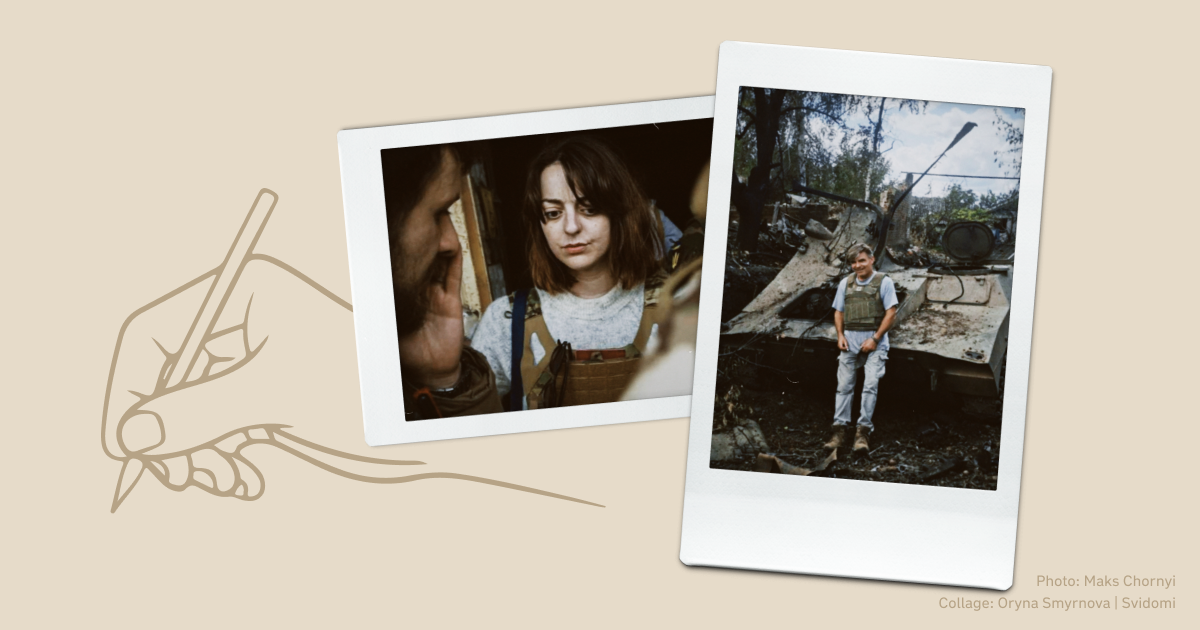The summer I spent in Donbas
Maks Chornyi
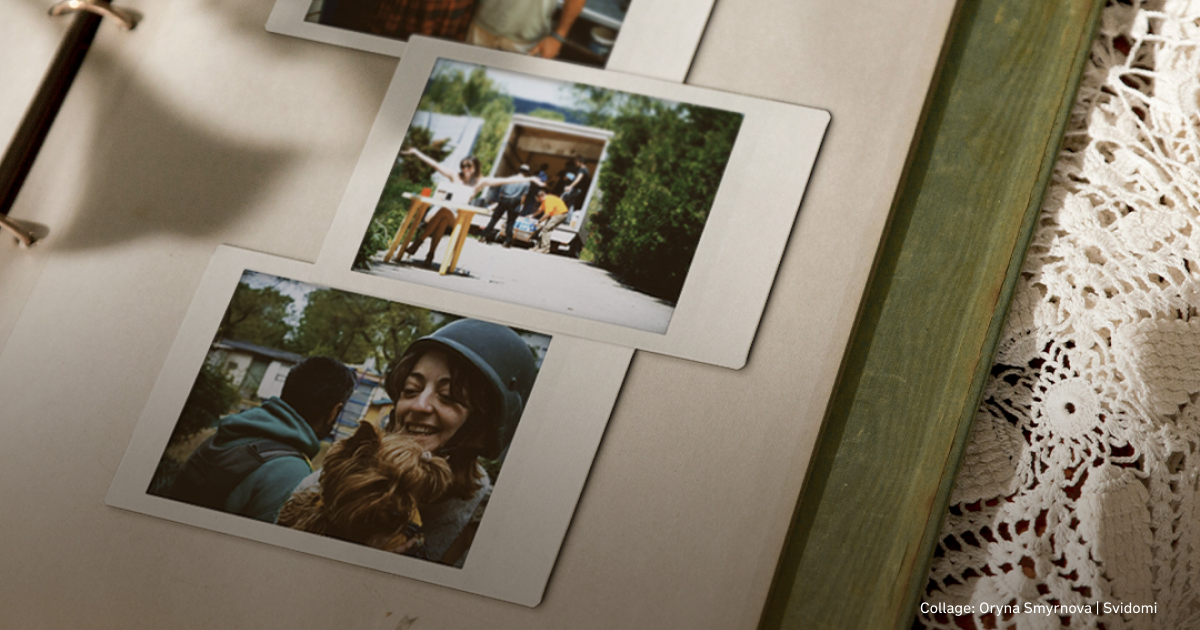
This story is about the summer I spent in Donbas as an interpreter for Road to Relief. Just as it is common for great figures to be recognised only after their death, the world got to know our organisation after a visit from the Grim Reaper.
This report is dedicated to Emma and Tonko, foreign volunteers and my companions, who were killed by Russian soldiers.
Embraced by the warmth of the sun during the day, the ground turns coldest at night. Enemy infantry leaves boot prints on it, and even on a hot summer's day, it sends shivers down your spine, no matter how far from the front line you are. Even when you're in the company of incredible strangers who have become your true friends in a matter of weeks.
In the East, friendships form as quickly and firmly as metastases in the final stages of cancer and cease to exist as quickly as the heart stops beating when hit by an enemy shell.
Made in Canada
As soon as I walked into the room, I shouted, "Hallelujah, God bless Canada!" Tonko smiled like a Cheshire cat, showing his snow-white veneered teeth in the twilight of the room. He started laughing so hard that he had to hold his stomach with both hands to keep it from bursting and me from having to wash his guts off the walls. As you may have noticed, Tonko is very affectionate. He is in his fifties, quite fit for his age, grey-haired with thick black eyebrows that line his forehead, a slightly snub nose and wrinkles around his lips caused by his frequent and violent laughter.
For three days, we lived together without saying a word to each other except "good morning" and "good night". All I could think about was where to get the remote control for the air conditioner to relieve the eastern heat. Tonko finally found it. And now a blissful 18 degrees Celsius filled our room. Out of amazement and grace at this freshness, I shouted that nonsense about "God Bless Canada" that made my neighbour laugh.
All I knew about him was that he had come from Canada to be a driver for our volunteer organisation, that he smoked Winston Grey and drank only Coca-Cola, pouring that black water from half-empty bottles into fuller ones.
I think we arrived in Sloviansk with our Canadian driver on the same day. I found out that a volunteer organisation had a vacancy for an interpreter and bought a ticket straight away. Now, we are driving around the frontline villages, delivering food, humanitarian aid and medicine. There are so many people here that it is physically impossible to meet everyone. Those who do use up the potential of their social capital, which was probably meant to last for decades.
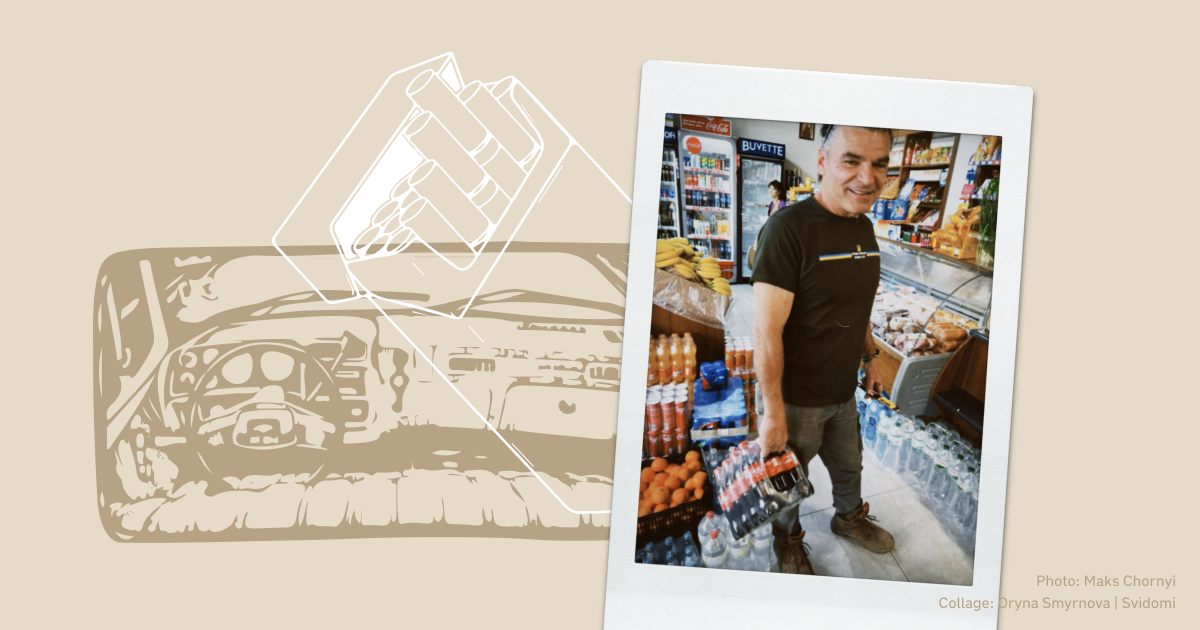
Help! Help! Help!
Road to Relief is an organisation of foreign volunteers. I work here as an interpreter alongside some lovely girls and moustachioed guys. Our areas are quite varied: humanitarian aid, food, water, toiletries, medicines, civilian evacuation and medevac.
Each branch has its own team. They go to the villages every day with pre-established lists of what is needed. Those villages that do not have such lists are the responsibility of the Needs Assessment Unit. It is a separate unit that goes to new settlements, compiles lists of items needed, finds a village/town coordinator and arranges for items to be delivered.
We have drivers, interpreters, leaders of each aid area, people in charge of computer work, several dozen cats and two dogs. This is the team we work with to help those who remain in the frontline areas. We also evacuate those who want to leave the danger zone.
People from almost every continent have come to Ukraine since the start of the full-scale war. Since then, the organisation has managed to visit hundreds of villages and evacuate dozens of people, cats, dogs, a donkey and a goat.
While communicating with many overseas representatives of humanity, I mentally visited America (North and South), Australia, Africa, and Asia.
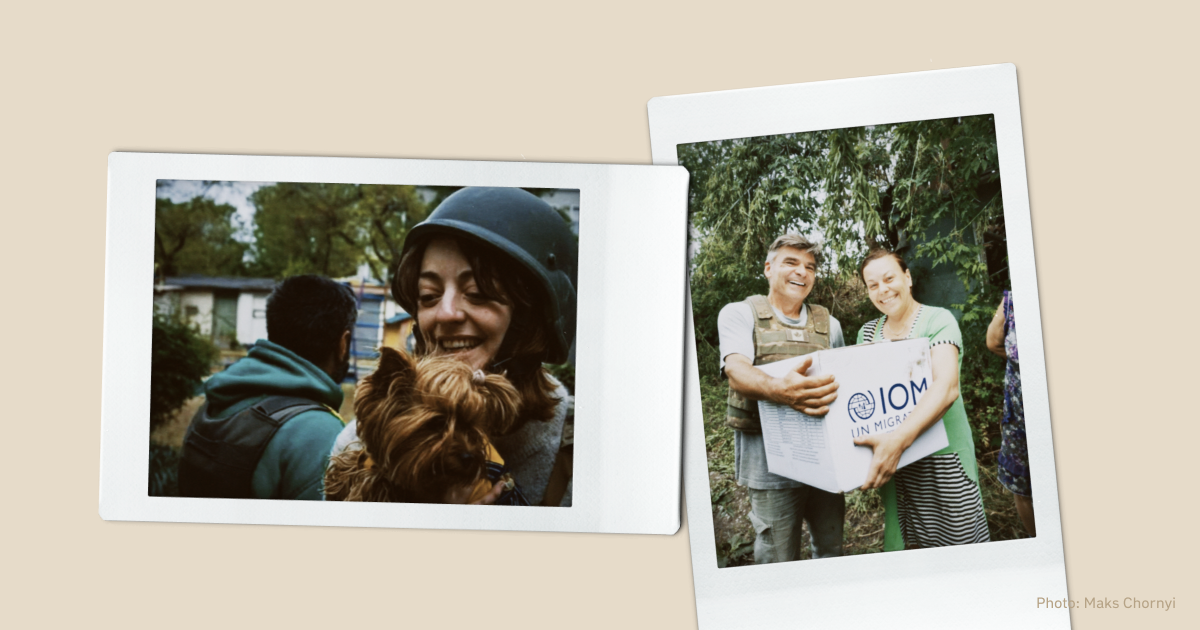
The house is swarming with volunteers, like a field of corn with locusts
In the area of private houses in Sloviansk, there is a three-storey building that looks somewhat awkward against the background of the surrounding buildings, or rather what is left of them after the shelling — just ruins and craters.
A hotchpotch of barking and meowing emanates from the yard around the clock, and passers-by shy away from the constant attacks of the house's main guardian, the yard dog Turnip. His body is as long as a sausage, and his hoarse bark is more likely to make you pee your pants with laughter than fear of the toothy monster.
Numerous vehicles are parked near the house — huge trucks, ambulances, cars, off-road vehicles, basically separate vehicles for each type of mission. All the wheels are carefully secured to a ribbed, shiny fence that lines the perimeter of the site. Drivers with interpreters and volunteers dismantle this "wall" of vehicles in the morning and reassemble it in the evening.
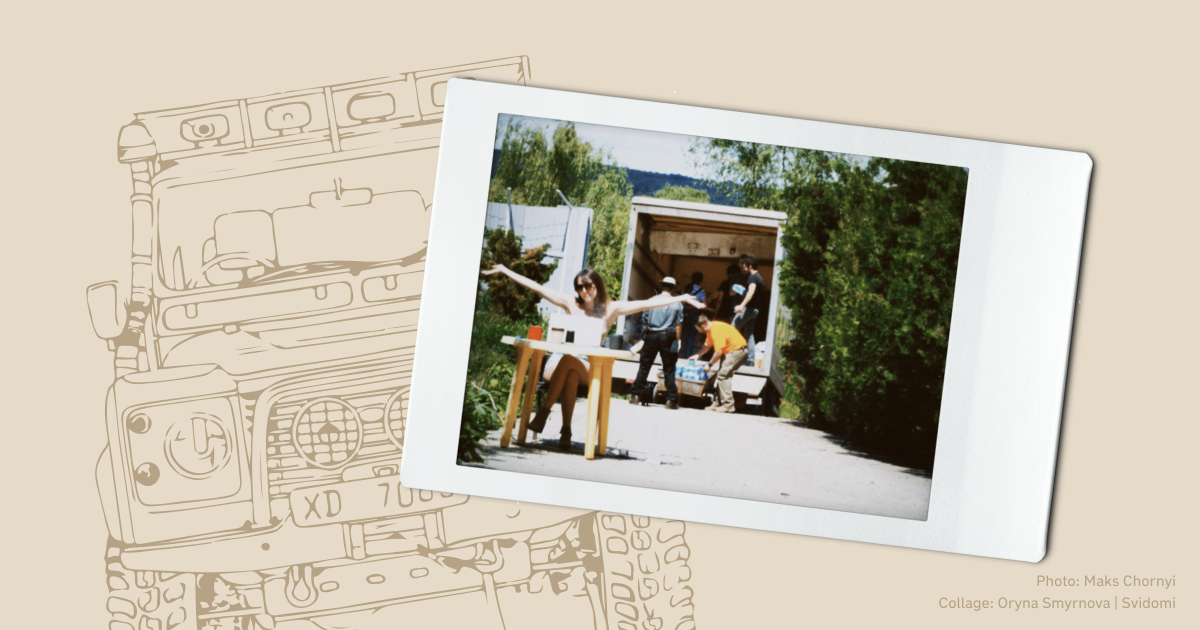
At the same time, when the sun has completely soaked the eastern land, the inhabitants of the house gather in the large kitchen after a general meeting. Now, it looks very cramped and tiny, but at the same time, cosy, like a cardboard box filled with your old childhood toys.
Everyone discusses the previous day, how many tanks they saw burned, how many air raids they heard, how many fighter jets they spotted, and how many plates of borscht they ate in the villages, ironically joking that the food the locals serve them protects them from Russian missiles.
They say the Grim Reaper avoids stomachs full of Ukrainian food.
Emma is the head of the organisation, and in the evening, she usually closes her laptop (for the first time in a day) and joins this noisy social hub. She often teaches me Italian words, even though she is from Spain. It turns out that Spanish and Italian are very similar. The first phrase I asked her to translate was "war in my house". Emma looked at me as if she wanted to break through my skin, right to the guy who sits in my head and generates all my thoughts, and ask him: "Is that what you want to learn first in Italian?". Then she replied: "Guerra a casa mia".
The kitchen is filled with loud conversations, laughter and noise every night. The next morning, as you put on your bulletproof vest and helmet and head out to another frontline village, passing the tables that remind you of the night before, you seem to inhale the remnants of life. And that makes the road seem easier and the explosions near the villages less disturbing.
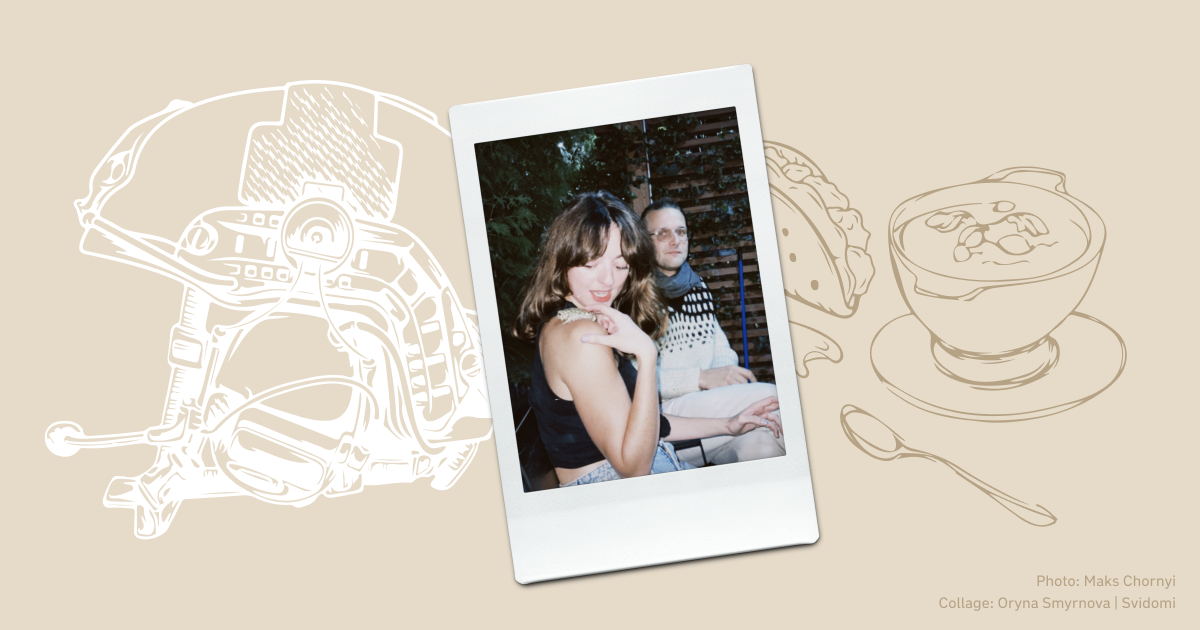
We have a tradition — when it's time to eat, one person cooks for everyone, and so on in turn. Of course, this system has some drawbacks — lazy people like me have eaten world cuisine without cooking anything in return. So, I tried Mexican food for the first time, Spencer's French chicken. I fell in love with pumpkin cream soup thanks to Tetiana, and I even ate vegan pizza, which I would never have tried without Vasylina's persistent efforts.
Evening is the time when the explosions in the volunteers' memories fade away, and they return to their normal, by Ukrainian standards a little crazy, mood.
The evening is filled with singing on the table, Johan's stories at a volume of a few tens of millions of decibels, dirty and very funny anecdotes from Australian paramedics, and the introduction of Ukrainian music to Emma.
Who are you, and what are you doing here?
The locals dance, sing songs, look at children's pictures and drink tea and homemade wine with the whole gang. The older people (who make up the vast majority of people left in frontline villages) treat the foreigners like their own children. They invite them to their apiaries, pick honey with their fingers from the honeycombs, treat them to flower pollen, give them jars of various tinctures, give them icons for good luck, recite poetry, and entertain us as much as they can.
Some of the widowed ladies have already chosen their favourite foreigners — most of them like Florian, a twenty-two-year-old redheaded German who knows how to impress any elderly lady. He has already become a legend in the "over seventy" clubs at the front.
Some villages have everything they need but no water. And we wonder if everything they have is really useful without drinking water.
For others, we just bring toiletries because they are expensive these days and older people don't have the money to buy them. Medicines are perhaps the most popular request from the locals — from painkillers to asthma inhalers. Some villages just ask us to bring only news. As they say, the rest of the stuff is not so important. Their biggest fear is waking up and not knowing what's happening outside the village or what troops are there.
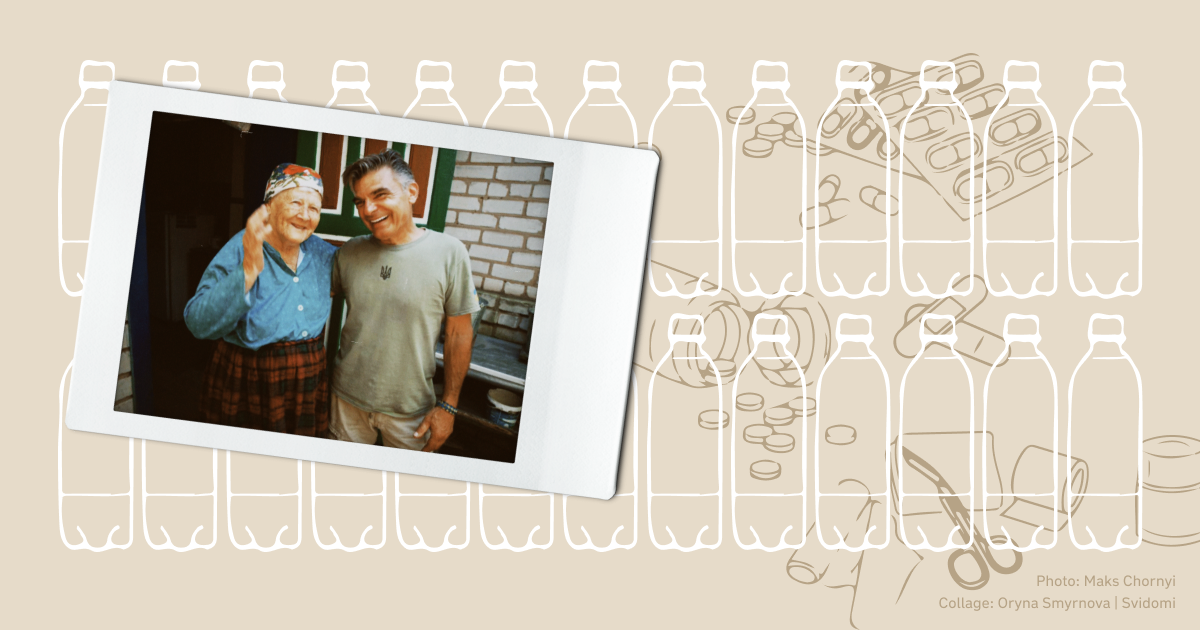
The first time I went to Chervone was when we came to bring medicine to the people there. We were sitting in the yard of a woman's house, and doctors were measuring her blood pressure and asking her about her ailments. Our American driver, Patrick, noticed a neatly stacked pyramid of rusty iron. He wondered what it was. An old lady in the yard saw the foreigner's interest in the metal collection and understood what he was asking. She approached him and raised both hands to the sky, imitating a rocket that flew and flew and flew. For added realism, she whistled through her three upper teeth. So, this imaginary rocket is flying. Patrick keeps his eyes on where it is going. Then the old woman suddenly changes the "rocket's" trajectory, drops the imaginary piece of iron, and throws it into her garden, almost falling into the crater made by the real rocket, and shouts a hoarse "Bang!", waving her arms around, imitating the shrapnel that scattered all over the garden, which she then collected in this pile. The lady starts to smile, saying, "Rocket, rocket", but Patrick's eyes are filled with tears, and he looks gloomy. He could only squeeze out a dry "Sorry".
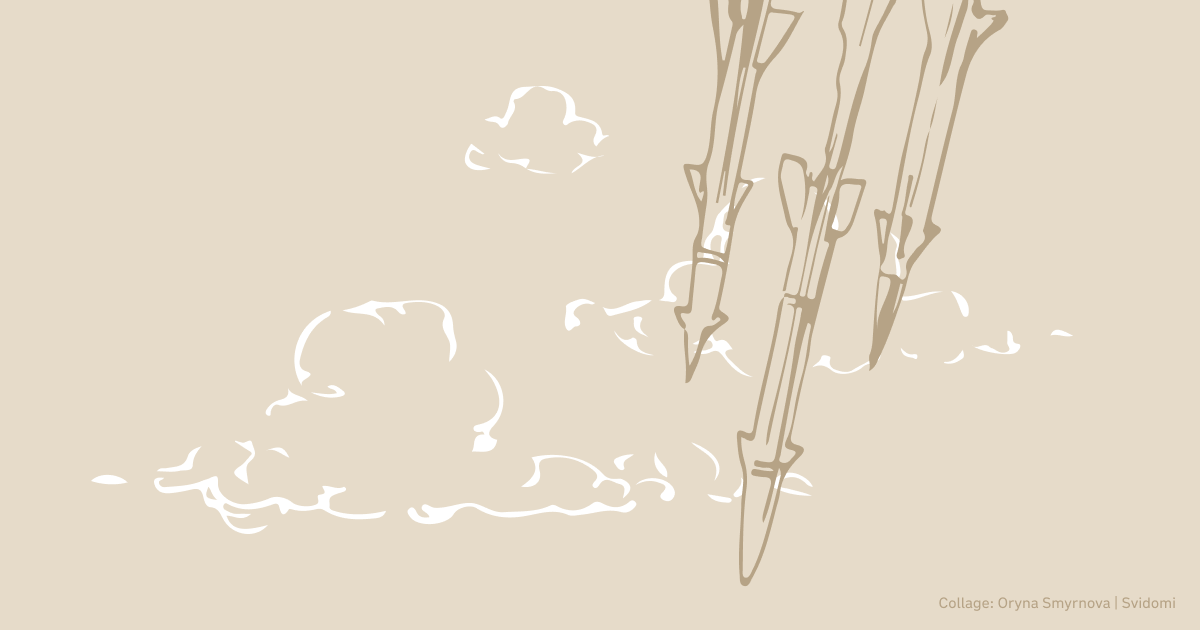
Time is up
A month passed, and for the first time in my life, I saw planes in the sky, fresh craters on the roads, and people from Donbas who always greeted us with tears in their eyes, taking medicines or other necessities and giving us some homemade and tasty food or drinks (like honey or wine). The world I had only seen on the television screen turned out to be much bigger than the camera showed. I have observed the East for twenty years through my friends' stories, Zhadan's poems, and the TSN evening news. But now, the digital image of the region was shattered by the rubble of the walls and the stench of the corpses.
Every night, I asked myself: "How is it possible to sing along to the radio in the evening, to tap your foot while Ukrainian soldiers are dying next to you?"
And every single evening, I thought about Kyiv at night — bustling, lit up by the lights of fancy roadside cafes, sometimes with live music, usually drunk in the centre and rarely quiet on a Friday. I was thinking about Kyiv while I was singing here in Sloviansk. Even in the car, on the way back to the frontline villages, I wondered how I could sing. I felt guilty for being happy, for dancing, singing and sometimes even joking. This guilt continued to haunt me in Donbas. But when I realised there was little I could do about it, I just accepted it.
A month later, I went to the Zaporizhzhia sector to write reports. I don't like to say goodbye. I prefer the phrase "See you later". This time was no exception, and on my last night there, I said those three words about seven thousand times. I promised the whole team I would return in a few weeks.
This story is dedicated to my friends. Tonko and Emma were killed on September 10, 2023, during a humanitarian mission. Russian troops opened fire on their car near Chasovyi Yar.
